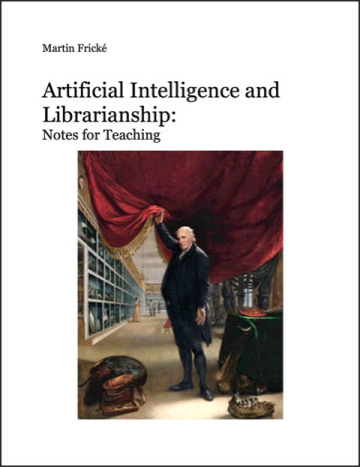AI and Librarianship: New Book Provides Comprehensive, Open Source Resource for Teachers and Students

“Generative AI is an important new area for librarianship,” says Martin Frické, a School of Information professor emeritus and author of the new book, Artificial Intelligence and Librarianship: Notes for Teaching. “The book is a gesture of support: it is free to all and carries a Creative Commons CC BY 4.0 International License, so it is truly open source.”

Readers—primarily instructors and students in artificial intelligence and librarianship courses offered in degrees such as the top-ranked University of Arizona Master of Library and Information Science—are welcome to distribute, remix, adapt and build upon the material in any medium or format, Frické says.
Though AI and librarianship courses are currently rare, he notes that “the advent of ChatGPT and similar large language models will likely make such courses commonplace.”
Artificial Intelligence and Librarianship opens with an introduction to AI, principally in relation to large language models, including an analysis of research and systems by others in the area. This context is then related to librarianship, particularly to roles that librarians might assume in the near future.
For example, Frické explores how AI may impact librarians working in synergy with machine learning researchers on areas such as intellectual freedom, or those working as “sentries” on privacy, intellectual property and bias. Other roles that librarians may be asked to fulfill, he notes, include serving as beacons of artificial intelligence literacy to library patrons and the world at large, managing libraries with AI tools, and being “AI-assisted astronauts researching and exploring the undiscovered public knowledge that exists in libraries and special collections.”
Though published in July 2023, a second edition is already planned for January 2024. “This intellectual area, and its practical applications, are advancing at an extremely rapid rate,” he says. The second edition—and publicly available drafts of the second edition prior to its official release—will help ameliorate that challenge.
Access PDF and Word versions of the book published by SoftOption here.

Martin Frické, School of Information Professor Emeritus.
Frické, now retired from UArizona, spent the latter part of his career as a professor studying logic and librarianship, and particularly the use of computers and symbolic logic to organize information. He has also researched big data; the knowledge pyramid; how blockchains, cryptotechnologies and torrents can be used to support “perfect librarianship”; machine learning; and the impact of large language models such as ChatGPT on librarianship. Frické is a computer programmer and developer and has taught networking, human-computer interaction, logic and web design, as well as courses in the organization of information, research methods and information ethics.

